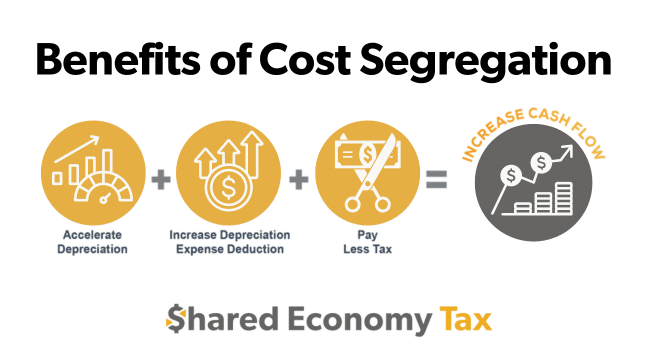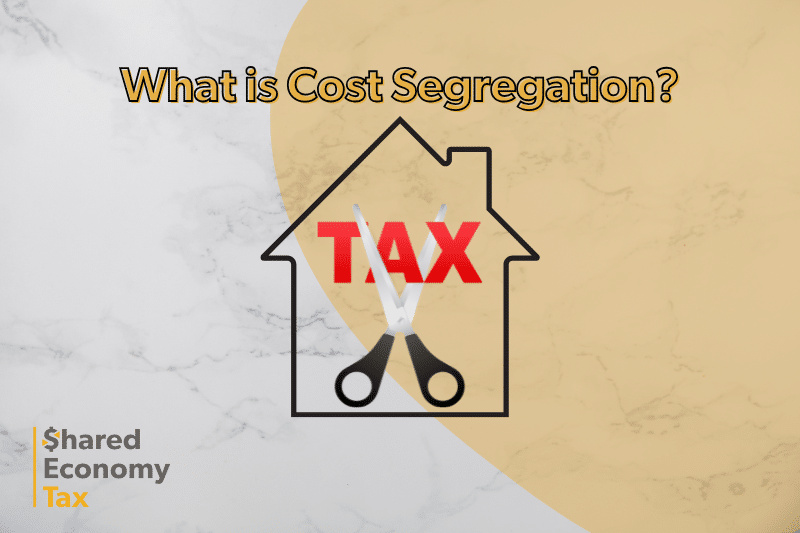Cost segregation can help you reap huge tax savings, and it’s an excellent defense against an IRS inquiry. However, there’s a lot of confusion around this somewhat sophisticated tax strategy. In this post, I’ll give you a layman’s overview of cost segregation and how it could significantly reduce your tax burden.
What is Cost Segregation?
Cost segregation is a tax strategy that accelerates depreciation deductions by identifying and reclassifying personal property assets to shorten the depreciation time for certain components of real estate.
Taxpayers must perform a cost segregation study with a certified provider to determine the monetary value of their depreciable assets.
Once the study is complete, you can tap into accelerated depreciation schedules and other benefits that can produce significant tax savings.
Cost Segregation in Real Estate
When you purchase real estate, you’re buying the land and the buildings on it. However, Tax regulations only allow you to claim depreciation on buildings & other man-made improvements to your land, like fences.
Cost segregation allows tax payers to separate these costs from the cost of the land, so they can take advantage of additional deductions.
Residential buildings typically use a 27.5-year depreciation schedule, while commercial properties depreciate over 39 years.
Most Airbnb rentals qualify as residential property, but you can’t depreciate the amount of your purchase that went towards the land.
A cost-segregation analysis allows you to precisely determine what percentage of your purchase went towards the cost of the land versus buildings.
Basically, most real estate transactions involve the purchase of both buildings and land. However, you can’t depreciate land, so you need to calculate how much you paid for the buildings and other assets, then calculate depreciation from there.
Buildings vs Land Allocation
You can choose from several accepted methods to determine your property’s building-versus-land allocation.
For the simplest method, you can use a standard allocation of 20% land and 80% building, but you could leave deductions on the table if you go this route.
Alternatively, you can use an appraisal report to determine the precise value of your buildings and land.
You will earn greater depreciation deductions if your building allocation is higher, so you want to ensure you’re not lowballing yourself.
Furthermore, a cost segregation study can identify other types of assets included in your real estate purchase that may qualify for an accelerated depreciation schedule.
For example, assets like property improvements, furniture, fences, and roads may qualify. You can depreciate assets like these on a faster schedule to earn greater deductions.

Depreciation Under Cost Segregation
Most assets are depreciated under a MACRS depreciation schedules. However, some types of property qualify for section 179 or bonus depreciation.
Section 179 gives you the option to fully deduct qualifying property in its purchase year. You can also claim bonus depreciation in some circumstances, but the rules change every year.
You can often use a five-year depreciation schedule for smaller items like appliances, carpets, and furniture used in rental properties.
Assets eligible for 15-year depreciation schedules include land improvements, landscaping, and fences.
Assets with a 7-year depreciation schedule include all types of property not listed under the previous categories.
Depreciation is complicated, but a cost-seg study can help you avoid improper asset classification and maximize your depreciation deductions.
How Can CostSeg Help Airbnb Hosts Save Money?
Airbnb property’s have higher rental income than long-term rentals, so hosts often incur taxable income from their properties. This is less common on a longer term rental, which typically falls under passive income.
As a result of this distinction, CostSeg has the potential to be particularly beneficial for Airbnb hosts. It allows short-term rental operators to squeeze every last drop of deductions out of their tax bill.
Getting Started with a Cost-Seg Study
A cost segregation study is completed by an appraiser, real estate professional, or CPA. CPA’s can recommend techniques to be used that often rely on generally accepted percentage allocations to each type of property. The gold standard is an engineering report that separates property into four categories: land, building, personal property, and land improvements.
While a cost segregation study isn’t strictly necessary, it is your best defense in the event of an audit. Historically, the IRS has accepted engineering cost segregation studies as a against asset allocation. The IRS has also accepted standardized account allocations as a defense in audits.
To complete a cost segregation study, you need to speak to an appraiser or your accountant. The pricing will differ based on the type of property and the intended purpose of the study.
Once the cost segregation study is complete, you will have a complete allocation of the purchase price of the property. The asset allocation will determine your depreciation expenses on the purchase over the next 27.5 or 39 years.
Cost Segregation Study Example
This journal of accountancy article includes extensive details on cost segregation studies and a detailed cost segregation study example. Click here to check it out.
Should Airbnb Hosts Use Cost Segregation for Short-Term Rentals?
There are many benefits to completing a cost segregation study for your Airbnb. You’ll be able to take more depreciation expenses in the early years of your endeavor and have a better idea of the value of your property.
There are also some drawbacks, including higher recapture amounts when you eventually sell your investment. You’ll need to weigh the pros and cons by considering your long-term plans for the property.
The professionals at Shared Economy Tax have decades of combined experience working with short-term rental owners and Airbnb hosts. We can guide you in the right direction when it comes to cost segregation and other complicated tax issues. Click here to set up a complimentary one-on-one strategy session with a tax pro now!
